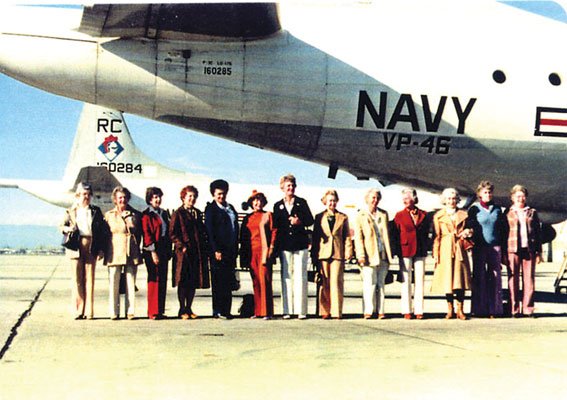When the U.S. military found itself in desperate need of pilots
six decades ago, they turned to women for help. More than 1,000
trailblazing women volunteered, becoming the first female pilots in
U.S. history to fly military aircraft as part of the Women Air
Service Pilots program.
When the U.S. military found itself in desperate need of pilots six decades ago, they turned to women for help. More than 1,000 trailblazing women volunteered, becoming the first female pilots in U.S. history to fly military aircraft as part of the Women Air Service Pilots program.
“When I reported for duty the first day, the officer said, ‘Yeah, we need help, but we don’t need women,'” Jean McFarland Koehler of Sunnyvale said. “All I could say was, ‘Yes sir!’ What I wanted to say was entirely different than that.”
Eleanor Wortz, 88 – a former WASP and member of the Santa Clara Valley Ninety-Nines, the world’s largest and oldest organization of licensed women pilots – learned to fly in 1940 in the first Civilian Pilot Training Program class. At age 23, she piloted B-24 Liberator bomber planes.
“I had two years of flying in the Air Force and it was a good life,” Wortz said.
More than 25,000 women applied for flight training. Of those, 1,830 were chosen and 1,074 graduated. Together, they flew more than 60 million miles. They flew every type of wartime plane, including B-17 and B-29 bombers.
Thirty-eight women pilots lost their lives in the service of their country during WWII. When a female pilot died, the military did not pay for her body to be flown home. Her fellow WASPs took up a collection.
Once male pilots began returning home, the WASP was unceremoniously disbanded and all record of female flight history was buried in classified archives. But many WASPs continued their flight endeavors by joining the Ninety-Nines. Founded in 1929 by Amelia Earhart and 99 women pilots, members helped each other to reach their flight goals.
Two of the earliest local pilots to join the 99s were Jean Blake and Harriet Brin.
“An article on WASPs in Life magazine inspired me,” Jean Blake said.
She went to flight school near Reno and had just 35 hours left to fly before the WASPs were disbanded.
Disappointed, Blake married a pilot she had met at the Sky Ranch Airport coffee shop where she waitressed.
“My husband had to promise me he would let me keep flying after we married,” Blake said with a chuckle. “We did keep flying. We had an airstrip on the west side of Gilroy, on 52 acres, just off Murray Avenue.”
Blake earned her pilot’s license and became active in the 99s.
“We used to meet people at the San Martin Airport when they flew in from Southern California and take them to the Garlic Festival,” said Verna West, local historian for the 99s.
“We also went to schools to talk to children about flight,” said Harriet Brin, a Hollister pilot and former 99s member. Brin will be working the Experimental Aircraft Associates booth at this weekend’s Hollister Air Show.
“We give Young Eagle Flights, taking students up to fly as well as supporting other educational and flight activities,” she said.
“At one time there were nine WASPs in our chapter, but now there is only one remaining, and she is in very poor health,” West said.
Recognition of these courageous women had been long overdue. On March 10, WASPs were finally honored with a collective Congressional Gold Medal of Honor during a ceremony at the United States Capitol.
This Memorial Day, we gratefully salute all female pilots for broadening the horizons for those who follow in their wing tips. Let us take this moment to pause and remember the names of those WASPs from the Santa Clara Valley Chapter of the 99s who did not live long enough to receive their medals: Mardo C. Crane, Dorothy Estep, Ruth Gamber, Patricia Gladney, Jackie Petty, Patti Sherwood, Margaret Standish and Dorothy Monohan.
You courageously answered our nation’s call in a time of need. You led the way for those brave women who have given and continue to give so much in service to this nation ever since you first defied gravity, showing us heaven’s the limit.













